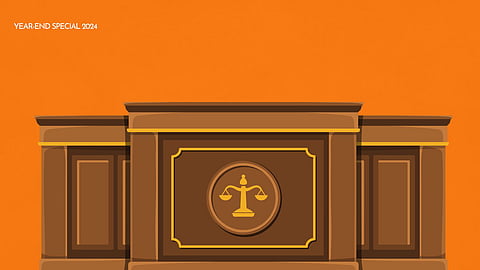

SPEAKING in the Constituent Assembly on November 4, 1948, Dr B.R. Ambedkar warned the Constituent Assembly about the fact that merely having a Constitution was not enough and that the people had to cultivate a constitutional morality.
He said, “It is perfectly possible to pervert the Constitution, without changing its form by merely changing the form of the administration and to make it inconsistent and opposed to the spirit of the Constitution.
“It follows that it is only where people are saturated with constitutional morality such as the one described by Grote the historian that one can take the risk of omitting from the Constitution details of administration and leaving it for the legislature to prescribe them.
“The question is, can we presume such a diffusion of constitutional morality? Constitutional morality is not a natural sentiment. It has to be cultivated. We must realise that our people have yet to learn it. Democracy in India is only a top-dressing on an Indian soil, which is essentially undemocratic.”
This year has seen a rise in the number of judges of constitutional courts— tasked with defending the Constitution— who have done a disservice to the Constitution both in letter and spirit. Which is why this year shall probably go down in history as the year of Hindutva judges.
There are, of course, several examples. Former Chief Justice of India Dr D.Y. Chandrachud indulged in a blatant display of faith by inviting Prime Minister Narendra Modi to his residence for Ganesh puja. Justice V. Srishananda of the Karnataka High Court called an area in India ‘Pakistan’ since there was a high number of Muslim residents there.
Justice Shekhar Jumar Yadav is facing an impeachment motion after calling for majoritarian rule in India and referring to Muslims as ‘kathmullas’. Justice Victoria Gowri (of the Islam is ‘Green Terror’, Christianity is ‘White Terror’ infamy) was confirmed as a judge of the Madras High Court despite several instances of hate speech being brought to light in the petition challenging her appointment. Several judges made their way to events hosted by the Adhivakta Parishad, the legal wing of the Rashtriya Swayamsevak Sangh (RSS).
These judges— as Ambedkar said— “invested their words with an amount of terror which would be sufficient enough to cow down any and every opponent of orthodoxy”.
It is clear that the battles of politics have started making their way to courts, and that judges see themselves as players in these battles, either seeking an elevation with the backing of the executive or, perhaps, in some cases a post-retirement sinecure.
An impartial judiciary is the last man standing in the face of orthodoxy as constitutional values come face-to-face with Hindutva. What does it mean to be an Indian?
Indeed, as Article 25, Explanation II tells us, a Hindu is not synonymous with ‘Indian’, while the Supreme Court has itself in the past told us that Hinduism is a way of life.
Studies in the United States, where the partisan nature of judges is perhaps much more pronounced than in India, show that the moment judges are perceived to be more biased and partisan in their approach, the public faith in judicial decision-making drops.
The bias here is not implicit, but explicit, made clear by either the extra-judicial utterances of a judge or, in some cases, their judgments. However, it is pertinent to state here that apart from a few minor rebukes or a meeting with the collegium, no step was ever taken against errant judges.
The message is clear to the judiciary: decide as per the wishes of the majority. Former CJI Chandrachud himself, in several post-retirement interviews, has reminded us that the courts cannot play a role of the political Opposition.
But can the courts themselves forget their role as a counter-majoritarian force necessary to check the executive? Can the courts decide that every arbitrary act of executive fiat, or blatantly unconstitutional Bills rammed through the Parliament, will be given the stamp of constitutional approval? How is the Constitution and, importantly, Part III and IV to survive the disruptive populist politics that ail the country today?
It is time to reinvent what the role of the judiciary is, for it is necessary to put an end to the slippery slope of orthodoxy and a blind belief in the State and to sound a clarion call for a more activist judiciary that can reinvigorate the ruins of transformative constitutionalism that have been left by these judges, because the Constituent Assembly had presciently warned us that without the post-colonial Constitution being transformative, it will only survive institutionally, without political sustenance or popular legitimacy.
The number of potential members of Parliament who swear an oath to the Constitution and who have given calls to change it in the run-up to the 2024 elections is a sign of the depleting legitimacy of the Constitution in public life and thought.
Indeed, the sooner that we bury the year of Hindutva judges as an outlier, the better it will be for whatever remains in the ruins of secularism in India.